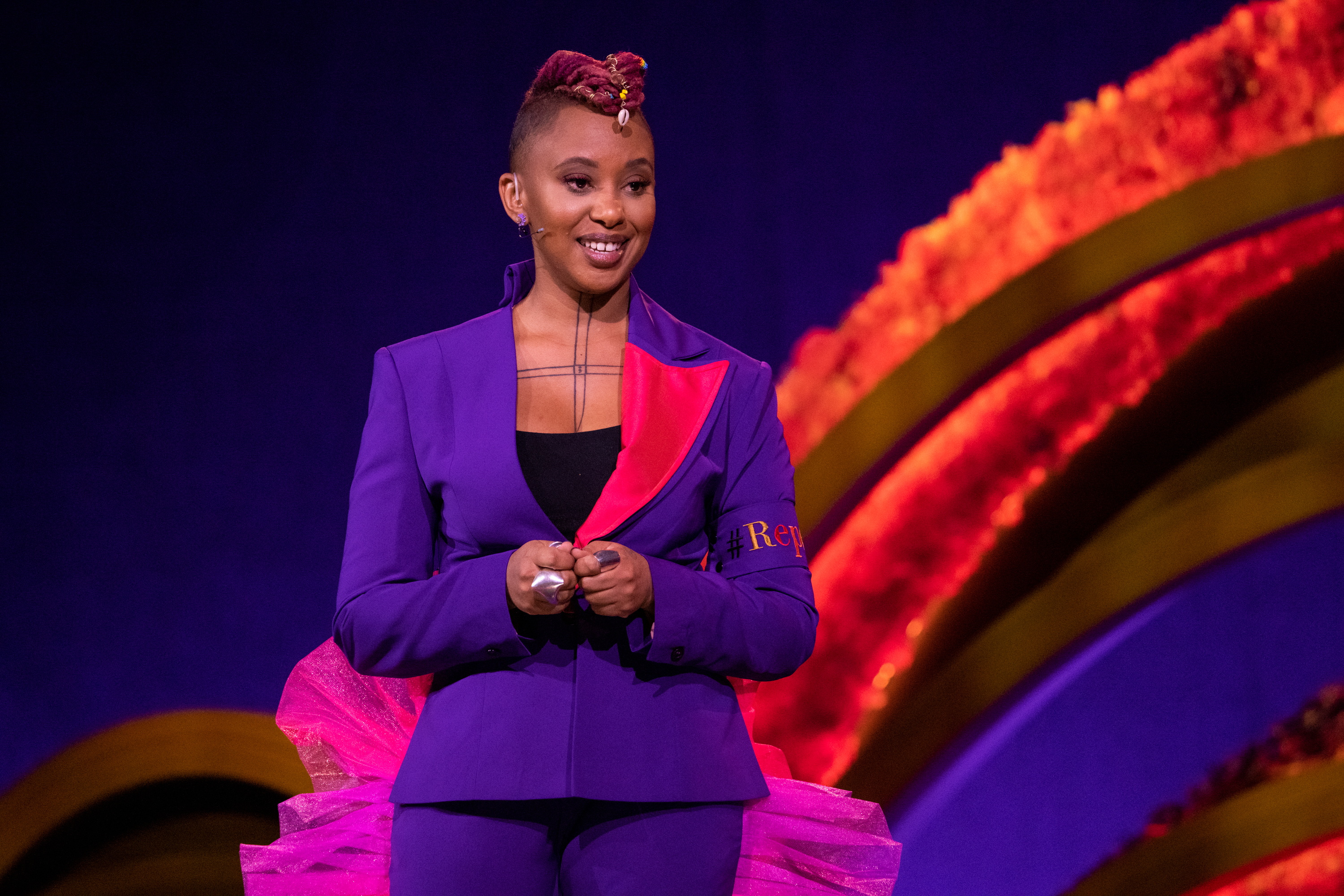
Sex educator and podcaster Kaz speaks at TEDWomen 2021: What Now? on December 2, 2021 in Palm Springs, California. (Photo: Gilberto Tadday / TED)
For Session 2 of TEDWomen 2021, seven speakers shared ideas and insights on everything from mental health and family structures to how to uplift personal and collective dignity.
The event: TEDWomen 2021: Session 2, hosted by TED’s head of curation Helen Walters in Palm Springs, California on December 2, 2021
Speakers: Charles C. Daniels, Jr., Smita Sharma, Zarlasht Halaimzai, Kaz, Francisca Mutapi and Diana Adams
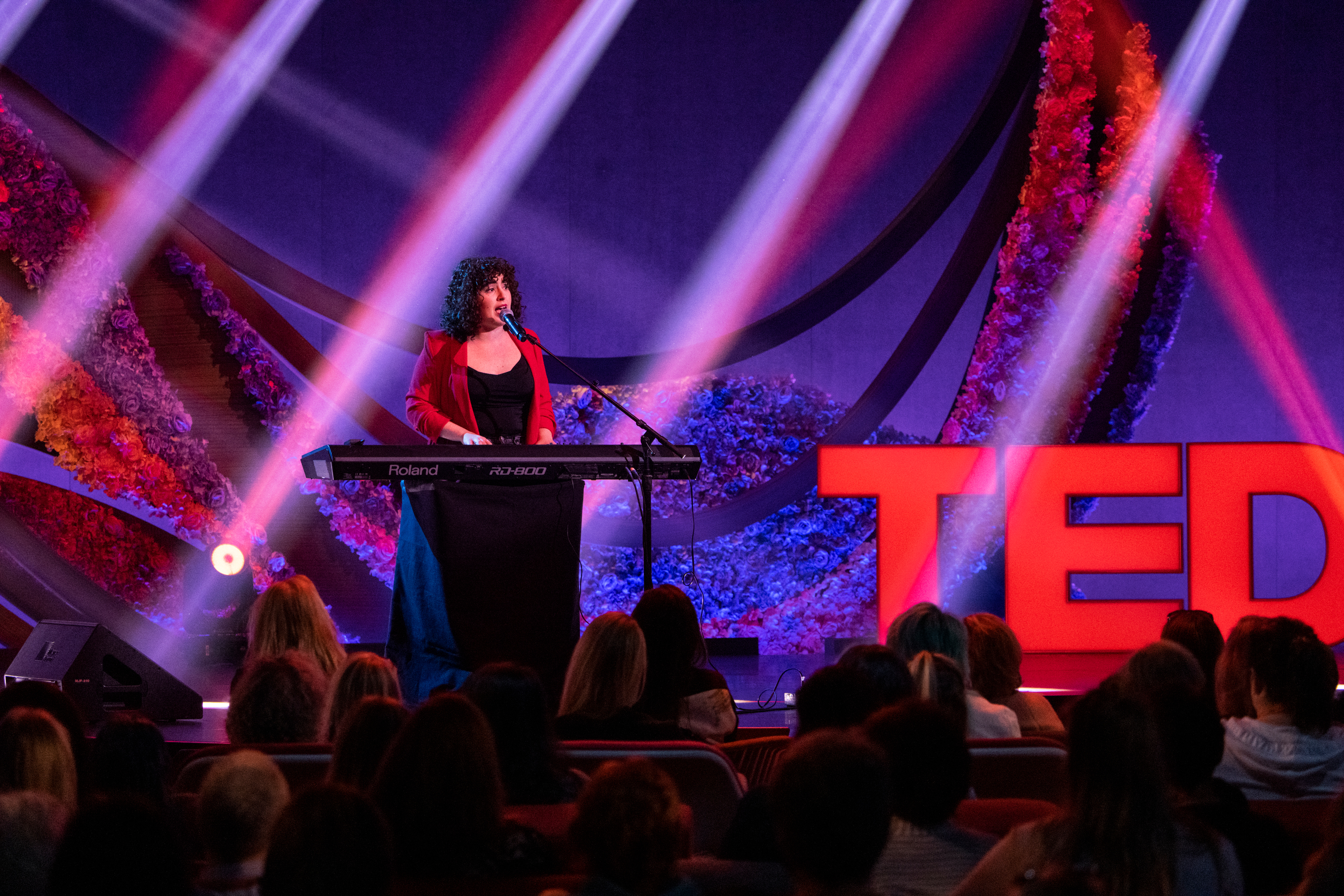
Musical comedian Marcia Belsky performs at TEDWomen 2021: What Now? on December 2, 2021 in Palm Springs, California. (Photo: Marla Aufmuth / TED)
Music and comedy: For a bit of comic relief, Marcia Belsky has some fun with a song about scrolling back through a date’s Instagram feed as well as “100 Tampons,” which lampoons NASA’s notorious decision to provide astronaut Sally Ride with an egregious supply of tampons for her six-day trip to the space in 1983. “And they asked: Will that be enough?” she sings.
The talks in brief:
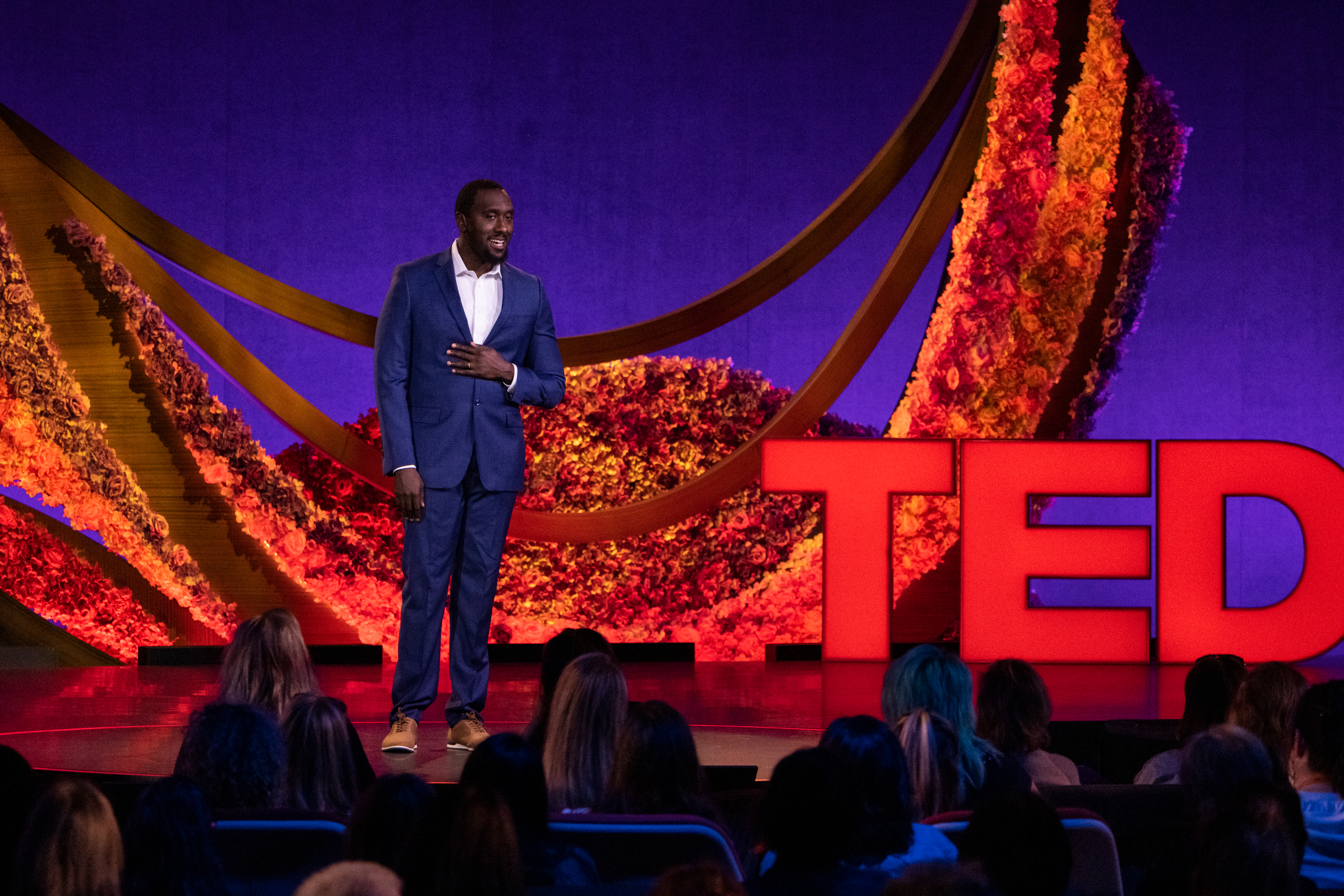
Scholar and therapist Charles C. Daniels, Jr. speaks at TEDWomen 2021: What Now? on December 2, 2021 in Palm Springs, California. (Photo: Marla Aufmuth / TED)
Charles C. Daniels, Jr., scholar, therapist
Big idea: In order to be present and connected to their children, fathers need to learn and be empowered to parent themselves.
How? An estimated 10 million children in the US see their fathers less than once a month, and research has shown that poverty rates, emotional and behavioral issues and school dropout and crime rates all increase when kids inconsistently see their fathers. Sharing his personal journey, Charles C. Daniels, Jr. recounts the profound impact of not seeing his own father — and explores the complex reasons a parent could have for not being there. The reasons that don’t get talked about are the ones that exacerbate the problem, he explains. That’s why he created Father’s UpLift, an organization that helps dads love, forgive and heal themselves and their children. They work with fathers to navigate shame, guilt and other challenges through group therapy, mentorship, coaching and support. Daniels, Jr. helps fathers reconnect with their kid and learn how to parent themselves so they, in turn, can be better parents.
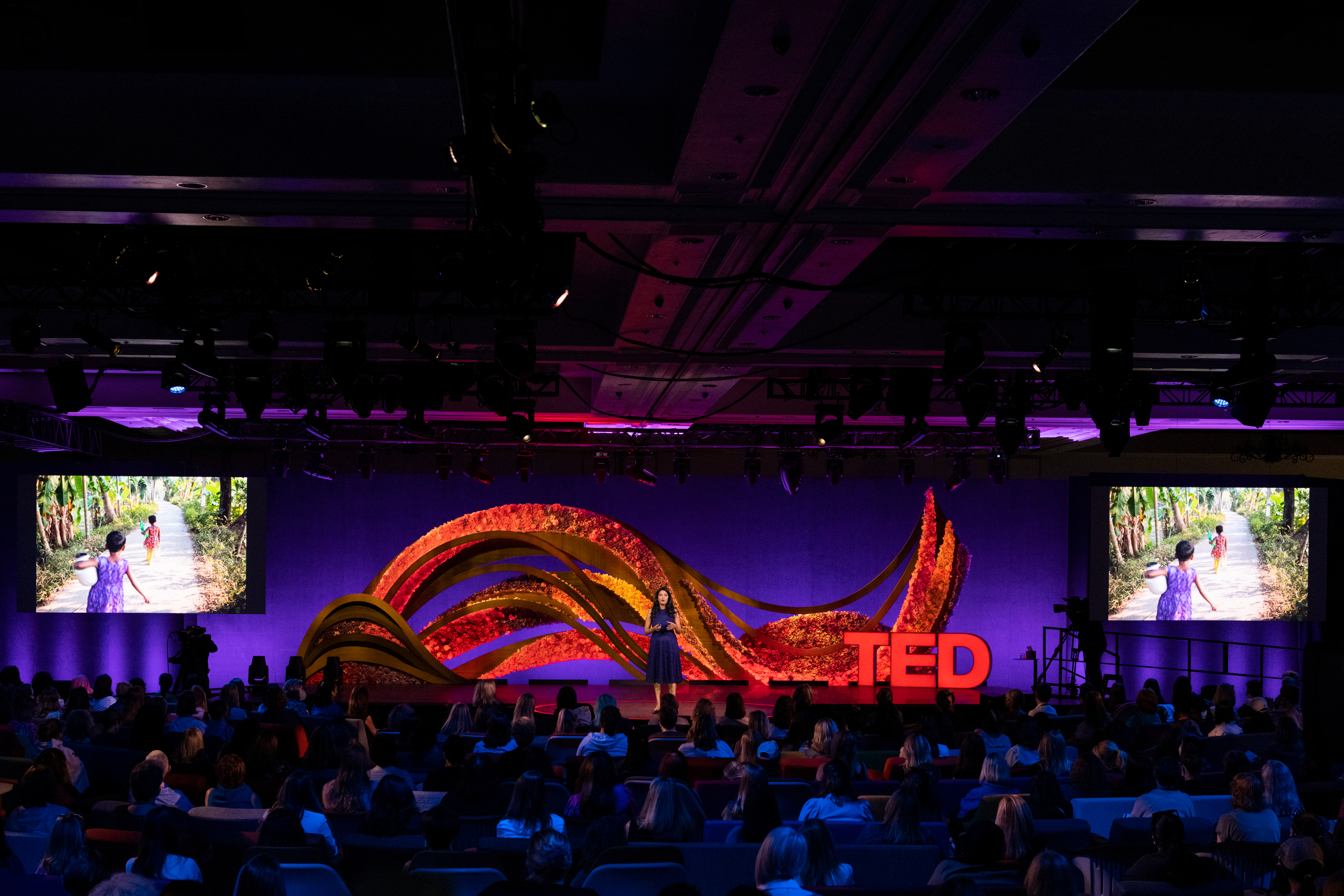
Photojournalist and visual storyteller Smita Sharma speaks at TEDWomen 2021: What Now? on December 2, 2021 in Palm Springs, California. (Photo: Marla Aufmuth / TED)
Smita Sharma, TED Fellow, photojournalist, visual storyteller
Big idea: Throughout the world, women are cast aside as unworthy of education or self-determination, relegated to tasks of parenting, household duties — and, sometimes, trafficked or enslaved. Through her moving photographs, Smita Sharma shares their stories.
How? By blending into her subjects’ lives and communities (sometimes under the guise of a researcher on “female hygiene,” something men are typically loathe to discuss), Smita Sharma gains the trust of her subjects: women born into poverty who are denied education, become victims of abduction, sexual violence or child marriage. With their consent, Sharma creates powerful visual narratives that depict these forgotten lives with grace and compassion, and that seek to inspire action around systemic issues of gender inequality.
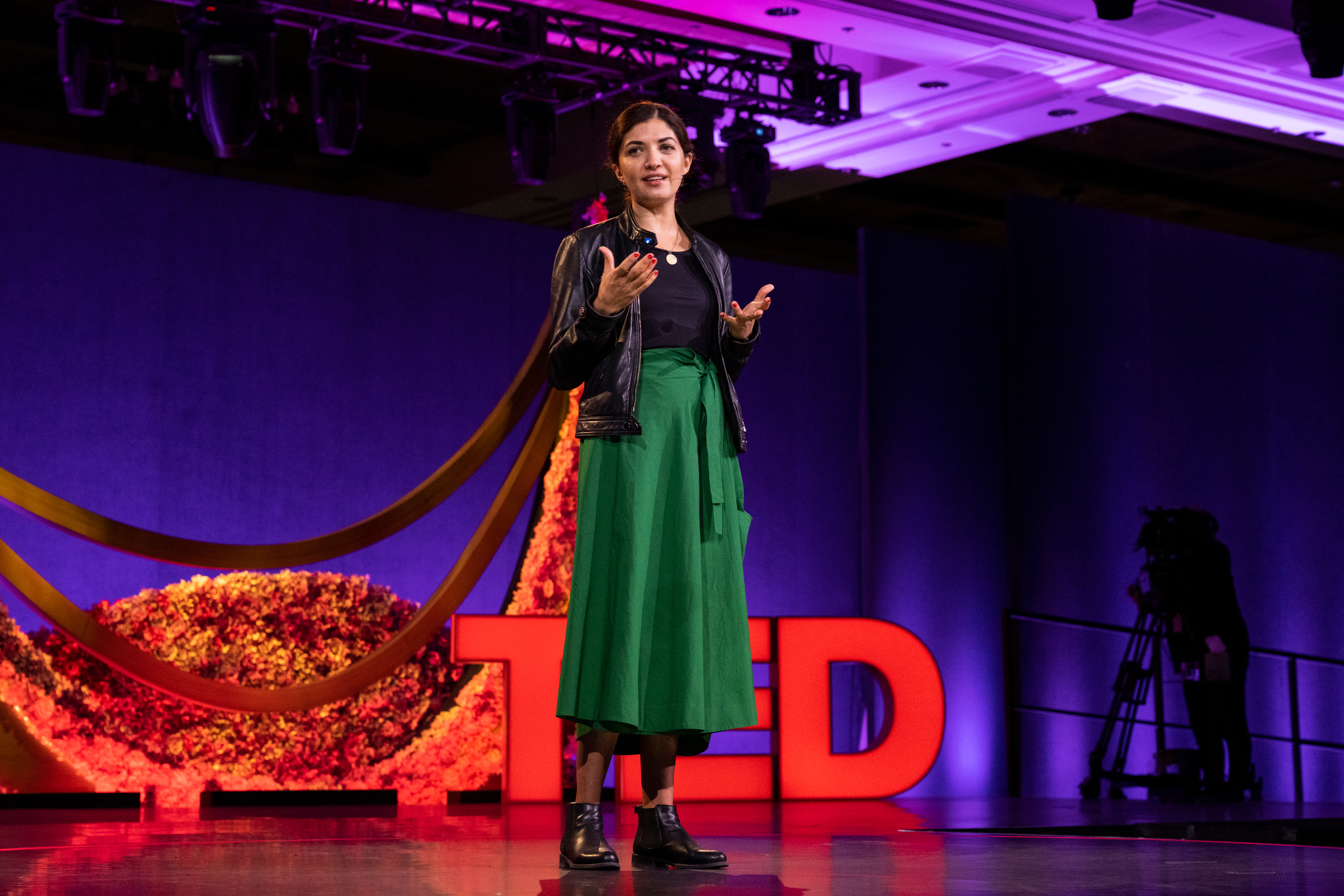
Writer and advocate for refugee rights Zarlasht Halaimzai speaks at TEDWomen 2021: What Now? on December 2, 2021 in Palm Springs, California. (Photo: Marla Aufmuth / TED)
Zarlasht Halaimzai, writer, advocate for refugee rights
Big idea: Understanding the emotional fallout of violence and displacement is more important than ever.
Why? As a child growing up in Afghanistan, Zarlasht Halaimzai was surrounded by violence. She vividly recalls her grandmother trying to shepherd her family to safety as rockets fell around them, and the overwhelming sense of fear that pervaded her life. The violence forced Halaimzai and her family to leave their home — and when the Taliban took over Afghanistan in 1996, her family sought asylum in the UK, beginning a new life. Now almost three decades later, Halaimzai is an advocate for refugee rights, working to help others overcome the devastation of war and the trauma of feeling expendable. Estimates suggest that today there are more than 84 million forcibly displaced people and 420 million children growing up in places where violence is the norm. Living under the threat of constant violence affects people even when they manage to get out, she says, leaving a terrible legacy on their bodies, minds, spirits and social bonds. With the Amna, Halaimzai uses art, mindfulness, dancing and storytelling to make sense of violence and the experience of being forced from your home, recognizing trauma and building community. The situation is bleak but not hopeless, she says, and there are things we can all do to participate in change. It’s time to demand governments stop investing in mass destruction. “Every vote that we cast should be against weapons of mass destruction, against automation of war,” she says. And she asks us to protect asylum seekers and to be good neighbors to displaced people who join our communities.
Kaz, TED Fellow, sex educator, podcaster
Big idea: Let’s create safe spaces for sex education (no shame or judgment allowed!) and build a curriculum to educate young people on consent.
Why? The best way to raise adults with healthy sexual habits is to teach kids about consent early — before sex is even a topic of conversation, says sex educator and TED Fellow Kaz. This would look like teaching kids that everything associated with their bodies can be negotiated, whether it’s a hug from grandma or asking permission to play tag with someone on the playground. A native of Kenya, Kaz experienced firsthand the detrimental effects of incompetent sex education. Her school’s curriculum centered shame, disturbing imagery and abstinence, leaving her and her peers largely without useful knowledge on consent, pleasure, communication, relationships and what healthy sexual behavior looks like. Now, she seeks to bring this “taboo” topic out of darkness because, as she says, the more we talk about sex, the safer and better it becomes for everyone.
Francisca Mutapi, global health researcher
Question: What’s going on with the Omicron COVID-19 variant?
Answer: There’s nothing unusual or unexpected about the COVID-19 virus mutating, says Francisca Mutapi: variants will continue to arise from all across the globe. The key is to ensure our mitigation strategies are sustainable and proportionate to the crisis. This includes all the usual suspects: making potentially high-transmission areas safer; ramping up and normalizing regular testing, as opposed to implementing travel restrictions and bans (which are largely ineffective); increasing vaccine uptake through education; and, as always, wearing face masks and washing hands.
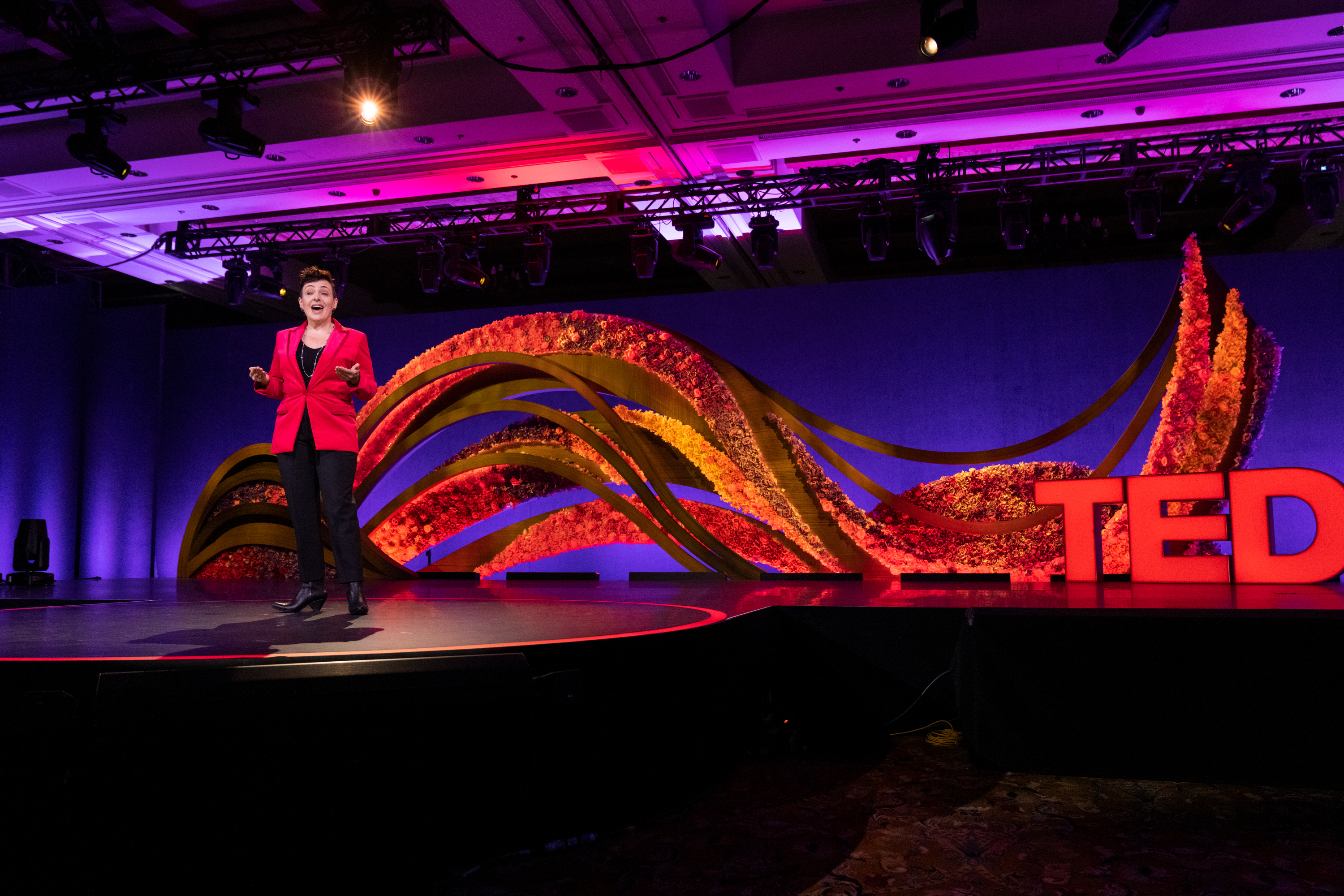
Attorney and LGBTQIA advocate Diana Adams speaks at TEDWomen 2021: What Now? on December 2, 2021 in Palm Springs, California. (Photo: Gilberto Tadday / TED)
Diana Adams, attorney, LGBTQIA advocate
Big idea: Laws should protect all forms of family — including “chosen family” (family we aren’t biologically related to) — and not just nuclear family.
Why? The majority of people in the US are not living in nuclear families with a spouse and kids — yet this is treated like it’s a bad thing. As a divorce lawyer, Diana Adams knows that marriage comes with more than a thousand benefits under federal law, from health insurance to better tax rates. “Our laws should move away from the idea that there is only one ideal family form and value all families as they exist,” says Adams. Advocating for more inclusive laws that also support LGBTQIA, polyamorous triads or quads, co-parents and domestic partnerships, Adams explains how a more expansive view of family would strengthen all relationships. This belief is why they founded the nonprofit Chosen Family Law Center, which works to change the law so it protects the entire spectrum of what a family could look like. “My definition of family is people committed to being there for each other no matter what,” Adams says.